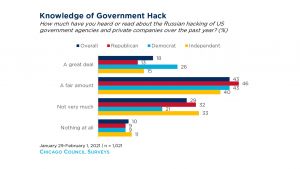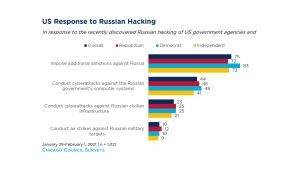SolarWinds Hack: Americans Prefer Sanctions over Retaliatory Cyberattack against Russia

Dina Smeltz and Brendan Helm analyze new public opinion data showing there is partisan agreement on how best to respond to the recent Russian hack.
The Biden administration has ordered a broad assessment of recent Russian actions, including the SolarWinds hack, the poisoning of Russian opposition leader Alexei Navalny, and using violence against protesters, to weigh whether and how the United States should respond. While surveys over the past few years have shown that Democrats have been more wary of Russia than Republicans, partisans agree that a limited response is appropriate.
Most Americans Aware of SolarWinds Hack
Late in 2020, cybersecurity experts alleged that Russia’s foreign intelligence service carried out a massive cyberattack on US government and private company networks around the world. To accomplish this, hackers infiltrated SolarWinds’ Office 365 system for months until they had the opportunity to plant a malicious software patch, which SolarWinds then unsuspectingly sent out to its customers. Former President Donald Trump’s homeland security adviser Thomas Bossert has said “the magnitude of this ongoing attack is hard to overstate.”
According to the January 2021 Chicago Council survey, six in 10 Americans say they have heard or read at least a fair amount about the recent hacking of US government agencies and private companies over the past year (61%), including 18 percent who have heard or read a great deal. Three in 10 have heard something, but not much, about it (29%).

Nearly Half Favor Retaliatory Cyberattacks on Russian Government
In response to the hacking, the Biden administration is considering different options, and the president’s chief of staff, Ron Klain, has said these include financial penalties like sanctions or retaliatory hacks of Russian infrastructure and people. Others, like Hal Brands of the American Enterprise Institute, have said this attack demonstrates that the US response cannot be solely defensive and that the United States must show it can reciprocate equally or with an even greater cyberattack. Still others suggest the United States should aim to target Russian President Vladimir Putin personally.
Chicago Council surveys have found partisan differences in how best to deal with Russia: Democrats prefer active efforts to limit Russia’s influence (66% in 2019), while Republicans prefer friendly cooperation (49% in 2019). Though neither group appears particularly concerned about a threat from Russia relative to China or extremist groups in the United States[SD1] , the January 2021 survey shows that more Democrats (14%) than Republicans (5%) sense a critical threat from Moscow.
Despite these partisan gaps, there is broad agreement across the board in how to respond to the SolarWinds hack. At least seven in 10 across political affiliations support imposing additional sanctions against Russia. A sizable portion of Democrats (48%) and Republicans (46%) favor retaliating with cyberattacks against the Russian government’s computer systems, but no more than a quarter favor conducting cyberattacks against Russian civilian infrastructure. Even fewer (no more than 12%) support conducting air strikes against Russian military targets. Those who have followed the story most closely are slightly more inclined to favor cyberattacks against Russia’s computer systems (60%) and civilian infrastructure (33%), but they are no more likely to favor air strikes (13%).

Conclusion
While during the Trump administration Republicans and Democrats diverged in the sense of threat from Russia—no doubt related to Russia’s interference in the 2016 US presidential election—these data show there is partisan agreement on how best to respond to the recent hack. Rather than escalate the situation, most Americans prefer adding more sanctions than taking a more assertive response. Informed Americans, however, would be comfortable with a retaliatory hack against Russia’s computer networks but would stop short at affecting civilians.
Methodology
This analysis is based on data from a January 2021 Chicago Council survey of the American public on foreign policy, a project of the Lester Crown Center on US Foreign Policy. The January 2021 Chicago Council survey was conducted January 29–February 1, 2021 by Ipsos using its large-scale nationwide online research panel, KnowledgePanel, among a weighted national sample of 1,021 adults, 18 years or older, living in all 50 states and the District of Columbia. The margin of error is higher for partisan subgroups or for partial-sample items.
Partisan identification is based on respondents’ answer to a standard partisan self-identification question: “Generally speaking, do you think of yourself as a Republican, a Democrat, an Independent, or what?”



